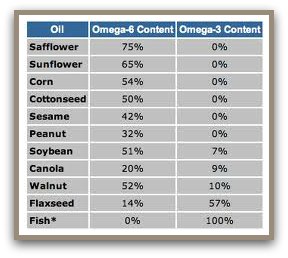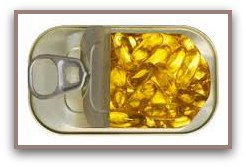|
Fish Oil Benefits: Give Your Body a 'Lube, Oil and Filter'
What are fish oil benefits? Do you remember being given that delicious cod liver oil when you were younger?
Think of your body as a car, what happens when you don’t give it oil? It sputters and groans and doesn’t run well just like your body. Feed your body fish oil and provide the essential lubricant that makes it run smoothly. Fatty Acids These fatty acids are omega-3 fats which the majority of us are deficient in. These fats cannot be made by the body and must be consumed through supplements or food sources. The best source of EPA and DHA fats are found in fish oil.

Fish oil benefits for your heart Research shows that fish oil supplements protect the heart, decrease blood fats, diminish blood clots, and improve circulation. In a high dose (3 grams +) fish oil works as a blood thinner. Drugs such as aspirin, Heparin and Coumadin also thin the blood, but are not as safe as fish oil.
Omega 3 and omega 6 imbalance Research indicates that our ancestors consumed a diet that contained a ratio of omega-6 to omega-3 of about 1:1. Today, the typical American diet is too high in inflammatory omega-6 fats and too low in omega-3 fats, estimates are that the ratio today is more likely 20:1 in favor of omega-6.
To reduce inflammatory omega-6 fats in the diet, avoid refined vegetable oils such as sunflower, safflower, and sesame oil and add more deep sea fish and fish oil supplements to your diet. Other sources of omega-3 fats include flax oil, flaxseed, walnuts. However these foods do not contain EPA and DHA like fish oil, instead they contain ALA which your liver has to convert to the active ingredients EPA and DHA. With fish oil you have the concentrated active ingredients, EPA and DHA, because the fish has already done the conversion for you! Fish oil is a very concentrated source of omega-3. Research suggests you need to take almost 10 times the amount of flaxseed oil to get the same amount of DHA and EPA found in fish oils.
Best Fish Sources of Omega-3

Do you need more fish oil in your diet?:
Fish oil supplements: There has been concern that fish oil supplements may contain dangerous PCBs and dioxins, however for the most part, they do not. 1) It has been molecularly distilled to ensure its purity. Have you heard about Krill oil?? krill oil is a different fish oil that has been in the news recently. The research on krill Omega-3 looks very promising. Personally I have started using the krill oil as recommended by my partners at ProGrade . Their oil is very clean and high quality, here are some interesting articles from these folks:
 Final thoughts:
Final thoughts:
Make it a priority to add this oil to your diet and reap all the fish oil benefits, your body will thank you. Fish Oils Help You Burn Fat Video
Go on...you know you want to click.....this is an excellent health and weight loss program I fully recommend!
|
Katrina Rees-Evans RHN,HNC,BA is a practicing Holistic Nutritionist with over 23 years experience in the Natural Health Industry in Canada.
Katrina currently manages a successful health and weight loss clinic in Ontario and has successfully coached over 1100 clients to better health.
Are You Deficient in Magnesium?

ProGrade supplements are high quality, check out their Krill Oil

Watch this video by Dr. Bryan Walsh on how Krill reduces inflammation in your body. No Longer Available.
Does Your Dr. Recommend These to YOU?













